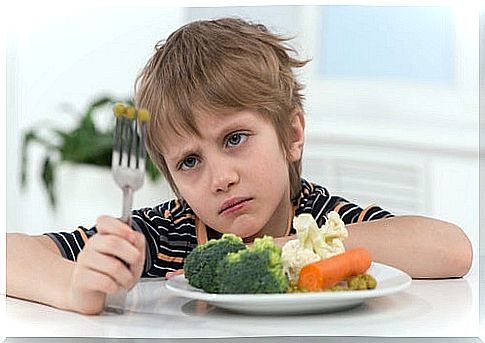Nutrition And Children: Truth And Errors

“Nutrition” seems to be a very common word in recent years. Even if the question of food raises conflicting opinions, it is equally true that we all want to know what to put on our tables.
When it comes to children, the concern grows exponentially, because the question is added: how do I get my children to eat?
In this sense, it can be difficult to get them to accept the healthiest foods. After hearing of mothers and fathers arguing with their children about nutrition, we are convinced that it is we adults who complicate our lives too much.
Give in to whims in nutrition?
We do not know why, but when we educate our children, we often forget how we adults are: people with defects, whims, frailties, etc. Maybe it can’t happen to us too to come back late in the evening and not want to have dinner? And maybe just want fruit?
Because when our children behave like this we tell them: “If you have room for dessert, then there is room for the rest of the dinner too.”

Is it not true that it is not a question of hunger, but of a whim? And why do we get so hot in the face of such a whim if it is such a natural thing that it even happens to us?
It feels like we want to get our kids in line right away to avoid future problems, like life is a growing graph with no ups and downs. Or as if we wanted to show ourselves to our children as individuals who never make mistakes in order to exclude the possibility that they too make mistakes.
Why do we complicate things?
One of the most difficult things for human beings is to accept the fact that life is changeable and that one must learn to live in this perspective.
Everything that happens to a child, at least before the age of seven or so, is variable. For this we must avoid putting a period or a label on issues.
This is the period in which children pay more attention to us, in fact we can insist on things that are important to us and that sooner or later they too will accept and put into practice.
The same goes for the topic of nutrition. For example, one day we prepare beans, we introduce them to our son, he doesn’t want them and we make the mistake of saying “he doesn’t like them”. And there you have it, the child believes it and will forever avoid beans.
All this is not far from the world of the game: either we convince him or he convinces us. In the example above, our son convinced us that he doesn’t like beans. Another way to act would be to accept that the child does not eat beans that day and offer him another dish (as long as we can prepare it and it is not tiring for various reasons) and, after a few days, offer him the beans again.
When we keep offering him the same thing over and over, he’ll eventually eat it. If he really doesn’t like it, he’ll keep saying no and then there’s nothing left to do but respect him.

Many parents don’t know if they should prepare something else when their children don’t want to eat what’s on the table. Of course, it depends a lot on how tired or fatigued a person is, more than on other things.
What is certain, however, is that it must not become a rule. Everyone should try to understand when the child does not want to eat something just to be the opposite and calmly tell him: “I’m sorry, there’s nothing else to eat.”
We must avoid making a drama when the children do not want to eat. Rather, let’s try to stay calm and offer them again and strategically what they have refused. In the end, the refrigerator is never completely empty and for sure no one will starve.
It must be said, however, that mothers or fathers get nervous not a little when their children do not want to eat and have a tantrum and if the children realize that this is a theme that sends parents out of anger, be safe. who can! In this way they do nothing but make it clear to their children what they should do when they want to impose their no.
Better to try to offer them other ideas to impose themselves, not on nutrition, therefore, which is a topic of vital importance for them.









